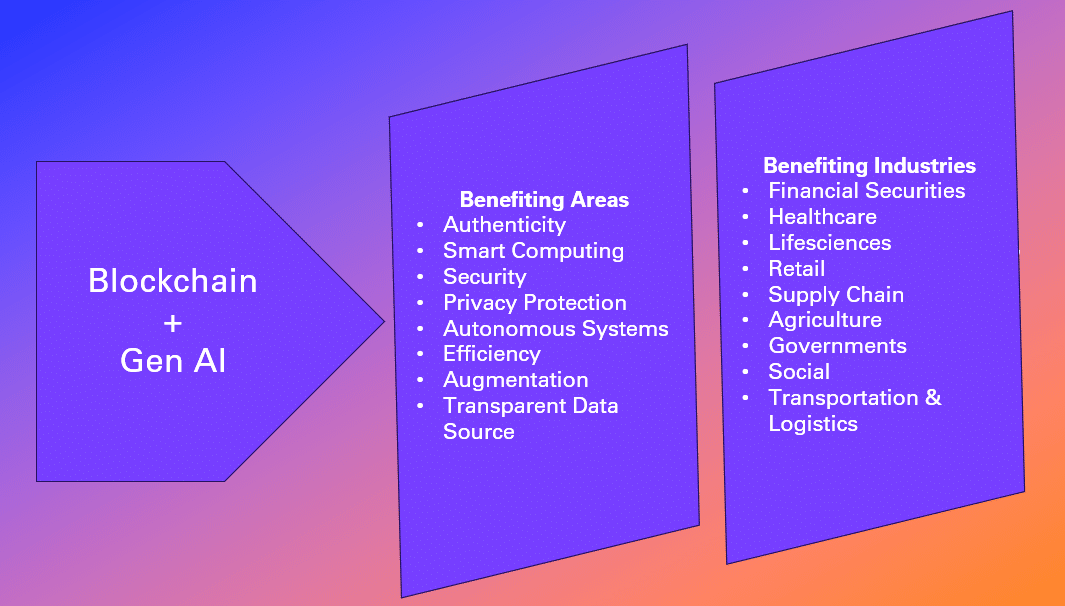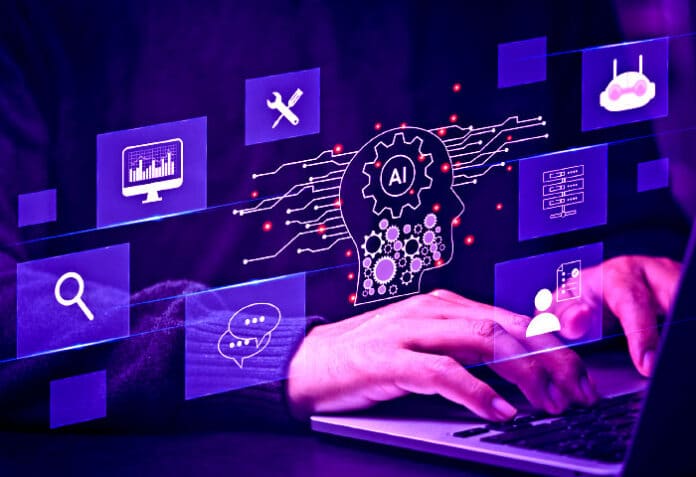The intersection of blockchain technology and generative AI will usher in a new era of efficiency, security, and creativity in the digital world.
In the ever-evolving landscape of technology, two groundbreaking innovations have emerged as frontrunners: blockchain and generative artificial intelligence (AI). Blockchain, with its decentralised and transparent nature, has transformed industries ranging from finance to supply chain management. On the other hand, generative AI, powered by neural networks, has demonstrated remarkable abilities in creating content that ranges from text to images and even videos. What if these two powerhouses joined forces? Incorporating AI in blockchain technology requires thought and design considerations to achieve desired results like the reduced cost of implementing digital ledger solutions.
The convergence of blockchain and generative AI
Blockchain technology has gained fame for its ability to establish trust through decentralisation and immutability. Its application spans across industries, enabling secure transactions, provenance tracking, and more. However, despite its impressive capabilities, blockchain faces certain challenges that can be mitigated through the integration of generative AI.
Generative AI, as exemplified by models like OpenAI’s GPT-4 (and soon to be GPT-5), excels in tasks involving content creation and manipulation. It can draft human-like text, design images, and even assist in complex problem-solving. By harnessing the power of generative AI, blockchain can overcome limitations in data processing, consensus mechanisms, and privacy for use cases like crypto in financial markets.

Enhancing data processing and analysis
Incorporating technology into business requires substantial investments, especially as both blockchain and AI are data- and process-intensive solutions that require large amounts of data storage with significant processing capacity. Blockchain networks generate vast amounts of data that must be processed and analysed for various purposes such as smart contracts, identity verification, and transaction history. However, the sheer volume of data can strain network resources, leading to slower transaction times and higher costs. Generative AI can streamline this process by analysing blockchain data and providing actionable insights. AI algorithms can identify patterns, anomalies, and potential security threats, thus enhancing the overall efficiency and reliability of the blockchain network.
Optimising consensus mechanisms
Consensus mechanisms are at the heart of blockchain’s functionality, ensuring that all participants agree on the state of the network. Traditional mechanisms like proof of work (PoW) and proof of stake (PoS) have their pros and cons, with energy consumption being a major concern for PoW. Generative AI can propose innovative consensus mechanisms that address these issues. By simulating various scenarios and testing new protocols, AI can optimise consensus algorithms for factors like security, scalability, and environmental impact.
Digital ledger technology (DLT) is one of the promising use cases that could adopt the new ways of working with blockchain leveraging generative AI technology. Such solutions require a significant amount of investments. However, the benefits they offer in streamlining financial expenses, addressing complex regulatory and compliance issues, and simplification of governance help to offset the costs. And they enable innovation and new offerings that could add to topline growth, disrupting the industry all over again.
Digital currency or tokenised bonds, which are becoming popular across the world, could benefit from the amalgamation of blockchain and generative AI in bringing transaction costs down, making capital markets more accessible, eliminating the intermediaries, and changing business models completely! Capturing untapped revenues is a big financial opportunity for many organisations with low-cost products and services.
In addition to finance, there are many use cases across healthcare, life sciences, supply chain, retail, etc, where responsible adoption of the two technologies could potentially improve decision-making, speed up transactions, lower costs, and create new opportunities.
Preserving privacy and security
While blockchain offers enhanced security compared to centralised systems, privacy remains a challenge. Public blockchains expose transaction details to all participants, raising concerns about sensitive data. Generative AI can contribute by developing advanced encryption techniques and privacy-preserving algorithms. By leveraging AI-generated cryptographic solutions, blockchain networks can secure data while still maintaining transparency and decentralisation.
There are also many use cases in which implementation of generative AI with private blockchain in a controlled environment can yield significant benefits. Only time will tell the nature and types of disruptions ahead.
Unleashing creative smart contracts
Smart contracts are self-executing agreements with the terms directly written into code. Generative AI can revolutionise the concept of smart contracts by infusing them with creative capabilities. Imagine a smart contract that can autonomously adapt to changing conditions or negotiate terms with other contracts. With generative AI, smart contracts can evolve from static pieces of code to dynamic and responsive entities, opening new avenues for innovation in decentralised applications.
Empowering decentralised autonomous organisations (DAOs)
Decentralised autonomous organisations (DAOs) operate based on predefined rules encoded in smart contracts. They enable decentralised decision-making and community governance. However, DAOs often face challenges in reaching consensus on complex matters. Generative AI can facilitate DAO decision-making by analysing community discussions and proposing synthesised solutions. This AI-augmented governance model can enhance the effectiveness and inclusivity of DAOs.
The convergence of blockchain technology and generative AI holds immense promise for the future. This partnership has the potential to elevate the efficiency, security, and creativity of blockchain networks. By enhancing data analysis, optimising consensus mechanisms, preserving privacy, and infusing innovation into smart contracts and DAOs, this symbiotic relationship could reshape industries and redefine the boundaries of technological capabilities.
The collaboration between blockchain and generative AI reminds us of the limitless possibilities that emerge when innovation converges. This synergy promises not only to revolutionise existing systems but also to inspire the creation of unprecedented solutions to global challenges.
Disclaimer: This article expresses the views of the author and not of the organisation he works in.












































































